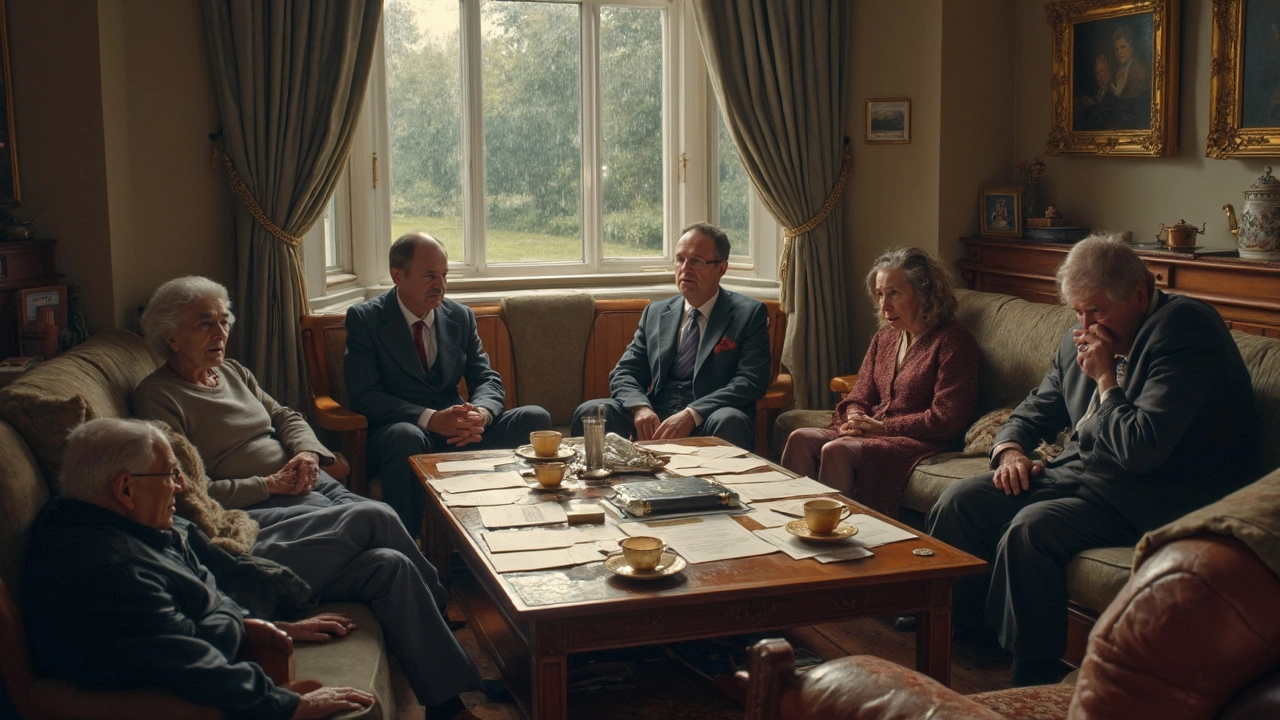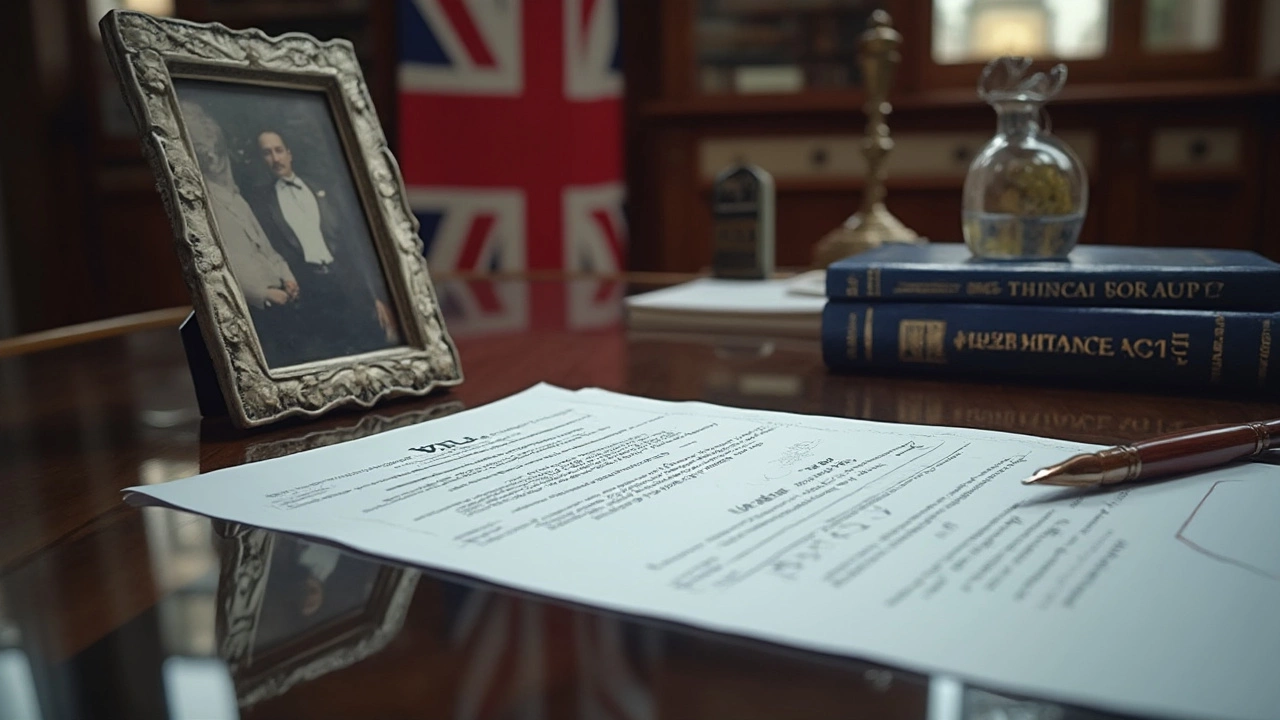Can a Husband Leave His Wife Out of the Will? Shared Ownership Twist
 May, 29 2025
May, 29 2025
It’s pretty shocking when you hear about a husband writing his wife out of the will—especially with a shared home in the mix. A lot of people think they can just choose who gets what, but the law doesn’t always work that way, especially if you own your house together. If your name is on that title along with your partner’s, your options get tangled fast.
A will alone doesn’t always control what happens to your home if you or your spouse dies. Most folks are surprised to find out that the type of ownership on your home often matters more than what’s written in a will. That’s even more important if you’re in a shared ownership setup or have split the mortgage with your partner.
This isn’t just technical stuff for lawyers. Real people get caught off guard, sometimes losing half a house or fighting for a place to stay, all because nobody explained the rules clearly. So if you’re thinking of leaving someone out of your will—especially your spouse—and there’s shared property involved, you’ve got to understand how the law really works. Here’s the lowdown on what actually happens and what you can do to keep things fair and stress-free.
- What Happens When a Spouse Is Left Out of the Will?
- Shared Ownership Homes: The Legal Catch
- Family Rights and the Law: Can You Really Cut Someone Out?
- Real-World Problems: Messy Outcomes and Surprises
- Tips for Couples: Protecting Each Other’s Interests
What Happens When a Spouse Is Left Out of the Will?
Here’s what most people get wrong: even if a husband leaves his wife out of the will, it doesn’t always stick. In a lot of places, the law gives a surviving spouse a shot at claiming some of the estate, no matter what the will says. This is especially true in the UK and most US states. The rules exist to keep things fair and stop people from leaving their partners with nothing.
If the will tries to cut out a spouse, she usually has legal rights to challenge it. In the UK, for example, the Inheritance (Provision for Family and Dependants) Act 1975 lets a spouse go to court and ask for a reasonable share, even if she isn’t mentioned. In the US, almost every state gives a surviving spouse something called an “elective share”—basically, a chunk of the estate that you can’t just wish away with a will.
It’s not just about money in the bank. Shared ownership homes get tricky. If you and your partner own the house as “joint tenants,” the property usually passes automatically to the survivor, not through the will at all. If it’s “tenants in common,” your share can go to whoever you name in your will, but your wife may still have a legal claim.
- If you leave your spouse out with no warning, prepare for a legal challenge. Courts usually favor the surviving spouse, especially when there’s a family home involved.
- Any debts or joint mortgages on shared property are a big deal—these don’t vanish and might affect what your spouse actually gets.
- Some countries have forced heirship laws. For instance, in Scotland, a surviving spouse has a right to a share of the “moveable estate”—that’s stuff like cash, investments, and personal belongings—even if left out of the will.
Anyone thinking of leaving a husband or wife out of the will needs to understand that laws are set up to prevent unfair surprises. If you’re worried, talk to a legal pro before doing something permanent. It’s the only way to avoid nasty family fights and court drama later on.
Shared Ownership Homes: The Legal Catch
Shared ownership homes make things way more complicated when it comes to leaving someone out of a will. A lot of people assume they can do whatever they want with their share, but actual law steps in hard if you try to sidestep your inheritance rules, especially with a spouse involved.
The first thing to look at is what kind of shared ownership you have. In the UK, for example, there’s “joint tenancy” and “tenancy in common.” With joint tenancy, if one owner dies, their share automatically passes to the other owner—no matter what the will says. For tenancy in common, your share is part of your estate, which means your will counts, but your spouse can often make a legal claim anyway.
Here’s how the two main types break down:
| Type of Ownership | What Happens When One Owner Dies? | Can You Leave Your Share to Someone Else? |
|---|---|---|
| Joint Tenancy | Home goes to the surviving owner(s) instantly, skips the will | No, the will doesn’t matter for this |
| Tenancy in Common | Your share goes into your estate, so the will comes into play | Yes, but legal challenges can pop up from the spouse |
If you bought through a shared ownership scheme—where you own part and rent part—the share you own can pass via your will if you have tenancy in common, but housing associations often have the right to approve buyers or force the sale. That can throw a wrench into any clever planning that tries to cut out your spouse.
One detail people miss: even if your name isn’t on the mortgage (but you’ve helped pay for it), courts sometimes view you as having a “beneficial interest.” That means your spouse might be able to claim a slice of the house regardless of what your will says.
There are also rules protecting spouses in most countries—UK “right of reasonable provision” laws and similar ones in the US and Australia—so leaving a partner out of your will might not stick if they challenge it. The court usually sides with the spouse needing a place to live.
- Always check the title register to see what type of ownership you have.
- If you want control, talk to a solicitor before changing your will or property arrangement.
- Don’t forget the housing association rules—these can override your plans.
Missing these details leads to family conflict and some nasty legal fights. Know your ownership type and what your local laws say before you assume your will is the last word on your home.

Family Rights and the Law: Can You Really Cut Someone Out?
Most people think a will is the final word, but the law often steps in to protect spouses—even if you try to write them out. If you’re married and your home has shared ownership, kicking your partner out of the inheritance picture is usually not as simple as crossing out their name.
Let’s get real: In the UK, for example, the Inheritance (Provision for Family and Dependants) Act 1975 lets your spouse make a legal claim if you leave them nothing (or not enough). Courts tend to back spouses, especially if they lived together or depended on your support. Similar rules crop up in many other countries, like Australia and Canada, and even different states in the US. Local laws can be strict about spousal rights, so you can’t just assume your wishes in a will will stick.
If your home is owned as joint tenants, your half passes straight to your spouse—no matter what your will says. If it’s tenants in common, your share can go elsewhere, but your spouse still might have a right to challenge. Here’s a quick run-down on the main ways property passes on:
- Joint tenants: Your share goes to your spouse automatically, even if your will says otherwise.
- Tenants in common: Your share follows your will, but a spouse can still ask the court for a bigger cut.
Court stats from England and Wales show that claims under the Inheritance Act have jumped by about 50% since the pandemic, as more people contest wills—mainly in families where someone felt left out or unfairly treated. Lawyers report winning extra support for spouses in most of these cases, even when the will tried to block them.
| Home Ownership Type | Spouse's Right After Death |
|---|---|
| Joint Tenants | Automatic ownership (overrides will) |
| Tenants in Common | May need to challenge the will for a share |
If you’ve got a shared ownership home, get legal advice before updating your will. Laws change all the time, and small details—like the paperwork on your property—can totally flip the outcome. For most couples, the law is set up so no one gets left on the street, no matter what’s written down. That’s why it pays to know the deal before making any big decisions.
Real-World Problems: Messy Outcomes and Surprises
When someone tries to keep their wife out of the will with a shared ownership home, disaster often follows. The biggest mess? Most people don’t realize that who actually owns the property matters way more than what’s written in the will. It’s not just talk—real families end up losing homes, fighting in court, and drowning in stress because of these mistakes.
Let’s say you both own your house as "joint tenants." If the husband dies, his share goes to the wife automatically, no matter what his will says. Doesn’t matter if she got left out of the will—she still gets the house. Change that to “tenants in common,” though, and it becomes a whole other story. Then the husband’s will does decide who gets his half, and if he tries to skip over his wife, she’s got a fight on her hands.
It’s more common than you’d think. In England, figures from Citizens Advice show about 1 in 4 inheritance disputes are about homes held as tenants in common—usually because someone didn’t realize their will could actually apply. Lawyers see it all the time: stepchildren, new partners, or even distant relatives popping up to claim part of the house.
Don't underestimate how bad things can get. Here are just a few headaches that crop up in the real world:
- Eviction threats: If you’re not careful, a spouse left out of the will might get pressured to sell their home by whoever inherits the other share.
- Court battles: Legal fights over property can drag on for years and eat up the inheritance in legal fees. UK Ministry of Justice stats show will disputes in England and Wales have doubled in the past decade.
- Family splits: Being left out can shatter relationships with stepkids or other family, sowing drama that lasts long after the funeral.
- Hidden debts: Sometimes property is tied up with loans or mortgages. If you suddenly own only half, you might be on the hook for the full payment.
Let’s put some key issues side by side:
| Type of Ownership | What Happens If Husband Leaves Wife Out Of The Will? |
|---|---|
| Joint Tenants | Wife keeps the home, will doesn't matter. |
| Tenants in Common | Will decides who gets his share. Wife might have to fight for it. |
Bottom line: if you own a home together, don’t just write a will and hope for the best. Understand your ownership type and double-check what it means for your spouse. A little planning now saves a mountain of trouble later.

Tips for Couples: Protecting Each Other’s Interests
If you and your partner share a home, don’t just cross your fingers and hope for the best. There are practical steps you can take to make sure neither of you ends up in a tough spot, especially if one of you passes away or if your relationship changes down the line.
First off, check how your home is owned. Most couples either own as “joint tenants” or “tenants in common.” Joint tenants means the home automatically goes to the other person when one of you dies—no matter what the will says. As tenants in common, each person owns a set share and can pass that share to someone else in a will. It’s a huge difference and it can make or break your plans. Double-check your paperwork or talk to your mortgage provider if you’re unsure.
Second, make your wills and keep them up to date. Too many people put it off and leave things to chance. A will lets you lay out exactly who gets what, but remember, the rules around shared ownership can limit what you actually control. If you want your share to go to your spouse, you need to spell it out—but if the title says joint tenants, it’ll skip the will completely.
It’s also smart to look at what protections the law gives spouses. In the UK, for example, a surviving spouse can usually make a claim if the will didn’t leave them enough—courts can step in and change things if it looks unfair. Each country has its own version of these rules, so don’t assume anything works the same as your friend’s situation.
Here’s a quick checklist to cover your bases:
- Confirm with your partner exactly how your property is owned (joint tenants or tenants in common).
- Draw up clear, up-to-date wills—and revisit them if your life or relationship changes.
- Think about signing a cohabitation or property agreement to spell out what happens if things go sideways.
- Talk with a solicitor or conveyancer who deals with shared home ownership—don’t try to guess your way through.
- Review any life insurance or mortgage protection, which can also cover the surviving partner.
No one gets excited talking about death or breakups, but getting your plans sorted now makes everything less painful later. You’re not just protecting your stuff—you’re protecting each other’s futures.